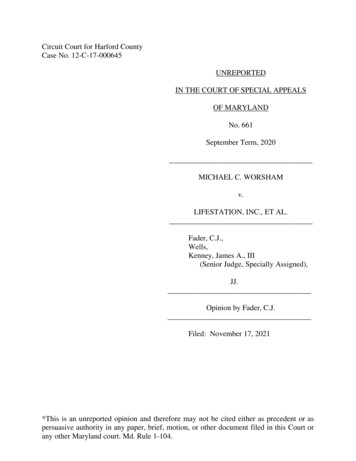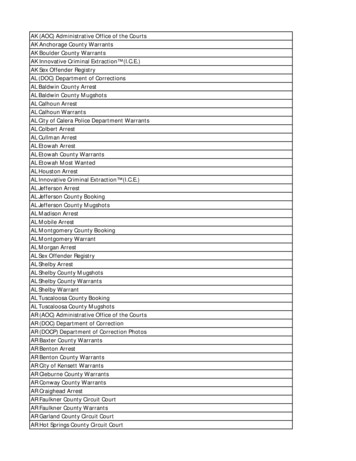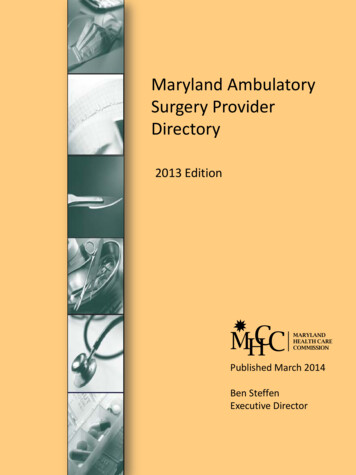
Transcription
Circuit Court for Harford CountyCase No. 12-C-17-000645UNREPORTEDIN THE COURT OF SPECIAL APPEALSOF MARYLANDNo. 661September Term, 2020MICHAEL C. WORSHAMv.LIFESTATION, INC., ET AL.Fader, C.J.,Wells,Kenney, James A., III(Senior Judge, Specially Assigned),JJ.Opinion by Fader, C.J.Filed: November 17, 2021*This is an unreported opinion and therefore may not be cited either as precedent or aspersuasive authority in any paper, brief, motion, or other document filed in this Court orany other Maryland court. Md. Rule 1-104.
—Unreported Opinion—Michael C. Worsham, the appellant, filed suit against appellee LifeStation, Inc. andappellee MLA International, Inc., in the Circuit Court for Harford County. LifeStation isa New York corporation that sells medical alert monitoring services and MLA is a Floridacorporation that contracted with LifeStation to provide telemarketing services forLifeStation’s products. In the operative first amended complaint, Mr. Worsham broughtclaims against LifeStation and MLA under the Telephone Consumer Protection Act(“TCPA”), 47 U.S.C. § 227, and its implementing regulations, and the Maryland TelephoneConsumer Protection Act (“MDTCPA”), Md. Code Ann., Comm. Law §§ 14-3201 –14-3202 (2013 Repl.), arising from nine telemarketing calls he received, eight of whichwere initiated as prerecorded calls and one of which was live. Mr. Worsham filed secondand third amended complaints in which he sought to add two individual defendants—JoseAyala, MLA’s CEO and principal, and Grace Sabako, a LifeStation employee—andadditional claims based on the same nine telemarketing calls.The circuit court ultimately: (1) granted LifeStation’s motion to strike the secondand third amended complaints; (2) granted summary judgment in favor of LifeStation onall counts in the first amended complaint; (3) denied a motion for partial summaryjudgment filed by Mr. Worsham; (4) entered a default judgment for 20,000 against MLA;1and (5) entered an order of default against Mr. Ayala, which the court later struck.1While this appeal was pending, Mr. Worsham filed a notice that MLA had been“administratively dissolved” by the State of Florida on September 25, 2020.
—Unreported Opinion—On appeal, Mr. Worsham argues that the circuit court erred in: (1) striking hissecond and third amended complaints and vacating the order of default as to Mr. Ayala;(2) granting summary judgment in favor of LifeStation; (3) denying Mr. Worsham’smotion for partial summary judgment; (4) denying his motions to compel written discoveryand a motion for immediate sanctions against LifeStation for failure to appear for adeposition; and (5) rescinding an earlier decision to recuse and by not disqualifying herself.We hold, first, that the second and third amended complaints were properly filedunder the Maryland Rules, that the record does not reveal a basis for striking them, and thatthe circuit court therefore abused its discretion in doing so. Second, it appears that thecourt’s award of summary judgment in favor of LifeStation was grounded at least in partin some confusion concerning the nature of Mr. Worsham’s claims and the facts in thesummary judgment record. Based on our review of the record, LifeStation was entitled tojudgment as a matter of law on the bases articulated by the circuit court only on Counts 9and 11 of the first amended complaint. Accordingly, we will affirm the award of summaryjudgment in favor of LifeStation on those counts and reverse as to Counts 1, 2, 3, 4, 5, 6,7, 10, 12, and 13.2 Third, we discern no error in the circuit court’s denial of Mr. Worsham’smotion for partial summary judgment and so will affirm that decision. Fourth, althoughwe discern no error or abuse of discretion in the discovery rulings Mr. Worsham challengesbased on the procedural status of the case at the time those decisions were made, we willaffirm some of those rulings and will vacate others so that they can be revisited on remand2Mr. Worsham voluntarily withdrew Count 8 of the first amended complaint.2
—Unreported Opinion—in light of the other rulings in this decision. Finally, we discern no abuse of discretion inthe court’s denial of Mr. Worsham’s motion to disqualify and so will affirm that decision.Accordingly, we will affirm in part, reverse in part, and vacate in part the judgment of thecircuit court and remand for further proceedings consistent with this opinion.BACKGROUNDStatutory and Regulatory BackgroundThe TCPA, codified at 47 U.S.C. § 227, was enacted in 1991 in “response toAmericans ‘outraged over the proliferation of intrusive nuisance calls to their homes fromtelemarketers[.]’” Krakauer v. Dish Network, L.L.C., 925 F.3d 643, 649 (4th Cir. 2019)(quoting Pub. L. No. 102-243 § 2(6) (1991)). “Among its provisions, the TCPA makes itunlawful for any person within the United States to ‘initiate any telephone call to anyresidential telephone line using an artificial or prerecorded voice without the prior expressconsent of the called party.’” In re Dish Network, LLC, 28 FCC Rcd. 6574, 6575 (2013)(“Dish Network”) (quoting 47 U.S.C. § 227(b)(1)(B)). The TCPA also authorizes theFederal Communications Commission to promulgate regulations “to establish a national‘do-not-call’ registry that consumers can use to notify telemarketers that they object toreceiving telephone solicitations.” Dish Network, 28 FCC Rcd. at 6575 (citing 47 U.S.C.§ 227(c)(1)-(4)). Under those regulations, “no person or entity is permitted to ‘initiate anytelephone solicitation . . . to any residential telephone subscriber who has registered his orher telephone number on the national do-not-call registry.’” Dish Network, 28 FCC Rcd.at 6575 (alteration in Dish Network) (quoting 47 C.F.R. § 64.1200(c)(2)). In addition to3
—Unreported Opinion—the prerecorded calls and do-not-call provisions, the TCPA authorizes the FCC topromulgate “technical and procedural standards for systems that are used to transmit anyartificial and prerecorded voice messages via telephone.” 47 U.S.C. § 227(d)(3).The TCPA may be enforced by the FCC, by state Attorneys General, and, as mostrelevant here, by means of statutory private rights of actions to enforce the prerecorded orartificial calling restrictions established in § 227(b), the do-not-call restrictions establishedin § 227(c), and FCC regulations implementing those sections. See Dish Network, 28 FCCRcd. at 6575; 47 U.S.C. §§ 227(b)(3) & (c)(5). A plaintiff bringing suit in state court underthose provisions may recover the greater of actual monetary damages or 500 “for each . . .violation.” 47 U.S.C. § 227(b)(3)(B) & (c)(5)(B). The TCPA does not create a privateright of action to enforce the provisions of § 227(d)(3) (or the FCC’s regulationsimplementing it), related to “technical and procedural standards for systems that are usedto transmit any artificial and prerecorded voice messages via telephone.”Telemarketing practices are also regulated by the Federal Trade Commission underthe Telemarketing and Consumer Fraud and Abuse Prevention Act, 15 U.S.C. §§ 6101 –6108. In that statute, Congress directed the FTC to “prescribe rules prohibiting deceptivetelemarketing acts or practices and other abusive telemarketing acts or practices.”15 U.S.C. § 6102(a)(1). The implementing regulations, known as the Telemarketing SalesRule, appear at 16 C.F.R. Part 310. Like the FCC regulations, the Telemarketing SalesRule prohibits any outbound call to a person whose number is listed on the national Do NotCall list registry (“Do Not Call List”) and otherwise regulates telemarketing sales. See4
—Unreported Opinion—generally 16 C.F.R. §§ 310.1 – 310.9. A person may file a civil action in federal court toenforce the Telemarketing Sales Rule if the person was “affected by any pattern or practiceof telemarketing” causing 50,000 or more in actual damages. 15 U.S.C. § 6104(a).The MDTCPA makes it a violation of state law to violate the Telemarketing andConsumer Fraud and Abuse Prevention Act, as implemented by the FTC, and the TCPA,as implemented by the FCC, and creates a private cause of action for violations of theMDTCPA. Comm. Law §§ 14-3201 – 14-3202. A plaintiff who files suit under theMDTCPA may recover the greater of the plaintiff’s actual damages or 500 “for eachviolation.” Id. § 14-3202(b)(2). “[E]ach prohibited telephone solicitation and eachprohibited practice during a telephone solicitation is a separate violation.”Id.§ 14-3202(c).Mr. Worsham’s Factual AllegationsMr. Worsham, who is self-represented in this case, maintains two phone numbers—a residential landline and a cell phone—both of which have been continuously listed on thenational Do Not Call List since July 15, 2006. He alleged in his first amended complaintthat, between September 2016 and April 2017, LifeStation or MLA on LifeStation’s behalfplaced eight prerecorded “robocalls” and one live phone call to either his landline or hiscell phone. We will refer to the prerecorded calls sequentially as the “first call,” the“second call,” and so forth through the “eighth call.” We will refer to the live call as the“live call.”5
—Unreported Opinion—The first call was made to Mr. Worsham’s cell phone on September 7, 2016. Aprerecorded female voice offered a “free medical device worth 475[.]” Mr. Worshampressed “1” to speak to a customer service agent and was connected with an agent named“Dennis,” who said he was with “Medical Alert[.]” The call disconnected when Mr.Worsham asked for more information about the advertised product.Mr. Worshamattempted to call the phone number that had appeared on his Caller ID, which included alocal 410 area code, but the number was not in service.The second, third, and fourth calls all were made to Mr. Worsham’s landline onSeptember 28, 2016, October 6, 2016, and February 24, 2017, respectively. Each beganexactly like the first call, with a prerecorded female voice offering a free medical alertdevice worth 475. On each occasion, Mr. Worsham pressed “1” to connect to a livecustomer service agent. The second and fourth calls were disconnected after Mr. Worshambegan speaking to a live agent. He never successfully connected to an agent during thethird call.The fifth call was made to Mr. Worsham’s landline on March 1, 2017. It began likethe other calls, with the “[s]ame” prerecorded female voice. Mr. Worsham pressed “1” andwas connected with a customer service agent who gave the name “Samuel.” Samuelexplained that the medical alert device was free, but that the monthly charge for monitoringthe device was between 29.95 and 39.95, depending on the type of device selected.Samuel advised Mr. Worsham that he would not need to sign a contract and could opt outof the monitoring service at any time. Mr. Worsham agreed to sign up to receive a medical6
—Unreported Opinion—alert device and provided his credit card number to Samuel. The call then disconnected.When Mr. Worsham tried to call back, he heard a busy signal. A few minutes later,Mr. Worsham received a phone call from an unknown number that did not connect. Hecalled that number and heard an interactive recorded message for a product called “911Alert.” He navigated the interactive menu and connected to a customer service agent whotransferred him to a second agent. That agent, who identified herself as “Nicole,” advisedMr. Worsham that she had been monitoring his conversation with Samuel. Nicole providedMr. Worsham with a customer service number, identified the name of the company as“Medical First Alert,” and told him the device would arrive in 3-5 days.That same day, Mr. Worsham’s credit card was charged 29.95 by a companyidentified on his statement as “& LifeAid 800-466-3300 NY.” The medical alert devicearrived two days later along with a “LifeAid Service Agreement” that Mr. Worsham wasdirected to sign and return. The agreement was between LifeStation, d/b/a LifeAid andMr. Worsham.On March 6, 2017, Mr. Worsham received the sixth call on his cell phone. It beganlike the first five calls. Mr. Worsham connected to a customer service agent who said hewas with “Medical Alert.” The call then disconnected.On March 12, 2017, Mr. Worsham received the live call on his landline. A womanwho identified herself as “Eve” called Mr. Worsham to “start [his] medical alert service.”Mr. Worsham told her that he wished to cancel his service. He was then transferred to asecond customer service agent, “Jasmine.” Mr. Worsham told Jasmine that he was7
—Unreported Opinion—cancelling because the company had misrepresented its name to him during telemarketingcalls. After a back-and-forth concerning the company’s name and whether it had beenmisrepresented, Jasmine told Mr. Worsham that he could mail his device back. When heasked how he would be reimbursed for the return of the device, the call disconnected.Four days later, on March 16, 2017, Mr. Worsham received the seventh call on hiscell phone, which began like the first six prerecorded calls with the same voice andmessage. After connecting with an agent who identified herself as “Sara” from “MedAlert,” Mr. Worsham asked if she was from “LifeStation” and said he already hadpurchased a device. The call disconnected.The eighth and final call was made to Mr. Worsham’s landline on April 3, 2017.The eighth call began with the same prerecorded message as the first seven. Mr. Worshamconnected to a customer service agent named Samuel, who sounded like the same agent(of the same name) from the fifth call. Samuel provided Mr. Worsham the same prices forthe monitoring service as in that earlier call. Mr. Worsham informed Samuel that healready had received a device from LifeStation. Samuel laughed and said, “Let me getyour number out of here” and hung up.The LawsuitOn the same day as the seventh call, March 16, 2017, Mr. Worsham filed acomplaint in the circuit court asserting that LifeStation’s conduct violated the TCPA andthe MDTCPA. The 13-count first amended complaint, filed a few months later, addedMLA as a defendant. In addition to the allegations set forth in the first complaint,8
—Unreported Opinion—Mr. Worsham alleged that LifeStation and MLA willfully and knowingly made calls andcontracted with others to make calls on their behalf in violation of state and federal law.He also alleged that LifeStation and MLA were aware of TCPA violations throughconsumer complaints that predated the calls to him; were aware of the telemarketingpractices being used and profited from them; and ratified the acts and conduct of thepersons involved in the calls.Mr. Worsham asserted that the eight prerecorded calls each separately violated thedo-not-call and prerecorded calling provisions of the TCPA and the FCC’s implementingregulations, as well as the Telemarketing Sales Rule, and, by doing so, also violated theMDTCPA.Mr. Worsham sought 48,000 in statutory TCPA damages, 36,000 instatutory MDTCPA damages, an order enjoining LifeStation and MLA from calling anypersons in Maryland in violation of the TCPA or FCC regulations, and reasonable costsand attorneys’ fees.In July 2017, LifeStation moved for summary judgment. LifeStation attached to itsmotion a supporting affidavit made by Mark Pezold, its corporate counsel, and a copy ofits “Marketing Services Agreement” with MLA. The agreement with MLA, which we willdiscuss in more detail below, stated that MLA was an independent contractor, not an agentof LifeStation, and included provisions requiring MLA to ensure that its employees weretrained on TCPA compliance and would follow all applicable state and federal laws whenmarketing LifeStation services. The circuit court denied LifeStation’s motion without ahearing.9
—Unreported Opinion—Mr. Worsham made extensive demands for written discovery, serving onLifeStation seven sets of requests for production of documents, two sets of interrogatories,and three sets of requests for admission. He also sought to depose a corporate designee.He filed six motions to compel responses to written discovery and a motion for immediatesanctions after LifeStation did not appear for a scheduled deposition. LifeStation twicemoved for protective orders. The court granted LifeStation’s first request, which soughtan order of protection prohibiting Mr. Worsham’s discovery of the identity of LifeStation’svendors and denied the second motion, which we will discuss later, as moot, after grantingsummary judgment in favor of LifeStation.In May 2018, Mr. Worsham filed a second amended complaint in which he addedtwo defendants: Jose Ayala, MLA’s CEO and principal; and Grace Sabako, a LifeStationemployee who he alleged had recorded the live call without his consent. He also addednew counts against LifeStation, MLA, and Mr. Ayala under the TCPA, regulationsimplementing the TCPA, and the MDTCPA, as well as claims against LifeStation andMs. Sabako under the Maryland Wiretap Law, Md. Code Ann., Cts. & Jud. Proc. § 10-402(2020 Repl.).LifeStation moved to strike the second amended complaint, which the court grantedwithout explanation. One week later, Mr. Worsham filed a third amended complaint thatwas nearly identical to the second. LifeStation again moved to strike and, this time, forsanctions. Meanwhile, the court entered an order of default against Mr. Ayala, who hadnever responded to either complaint filed against him.10
—Unreported Opinion—While the second motion to strike remained pending, Mr. Worsham separatelymoved for partial summary judgment on his wiretap law claims and the TCPA claims inthe third amended complaint. With respect to the TCPA claims, Mr. Worsham initiallymoved for partial summary judgment only on the fifth call, which, as we will discuss, isthe only prerecorded call that LifeStation admits was made on its behalf. Mr. Worshamlater filed a separate motion for partial summary judgment on his TCPA and MDTCPAclaims that encompassed all eight prerecorded calls.Accompanying that motion,Mr. Worsham filed an affidavit containing a description under oath of the eight prerecordedcalls, the delivery of the solicited device, and his reasons for believing that the callsoriginated from or on behalf of LifeStation.In December 2018, LifeStation renewed its motion for summary judgment, to whichit attached a slightly modified supporting affidavit made by Mr. Pezold and a copy of thesame Marketing Services Agreement with MLA.In October 2019, the court held a hearing on the pending motions,3 which it resolvedin a series of memorandum opinions and orders issued in February 2020. First, the courtgranted LifeStation’s motion to strike the third amended complaint and awardedLifeStation 1,137.50 in fees and costs as a sanction pursuant to Rule 1-341(a). Second,based on the order striking the third amended complaint and having previously struck thesecond amended complaint, the court vacated the order of default entered against3At the outset of the hearing, Mr. Worsham made an oral motion to disqualify thehearing judge, which the court denied. A written motion to disqualify the judge had beendenied prior to the hearing.11
—Unreported Opinion—Mr. Ayala. Third, the court denied Mr. Worsham’s motion for partial summary judgmenton the wiretap law claims, which were contained only in complaints that had already beenstruck. Fourth, the court denied Mr. Worsham’s motion for partial summary judgment onhis TCPA claims concerning the fifth call. Fifth, the court granted LifeStation’s motionfor summary judgment on all counts in the first amended complaint. The court also deniedas moot Mr. Worsham’s motions to compel discovery and for immediate sanctions andLifeStation’s motion for a protective order. The court later denied Mr. Worsham’s motionto alter or amend the judgments.Mr. Worsham then moved for a default judgment against the only remainingdefendant, MLA. On August 4, 2020, the court entered a default judgment against MLAand in favor of Mr. Worsham for 20,000. This timely appeal followed.DISCUSSIONI.THE CIRCUIT COURT ABUSED ITS DISCRETION IN STRIKINGMR. WORSHAM’S SECOND AND THIRD AMENDED COMPLAINTS AND INVACATING THE ORDER OF DEFAULT ENTERED AGAINST MR. AYALA.A decision whether to grant a motion to strike is committed to the discretion of thecourt. Bacon v. Arey, 203 Md. App. 606, 667 (2012). Mr. Worsham contends that thecircuit court abused its discretion in striking his second and third amended complaintsbecause its orders were inconsistent with Maryland’s policy to allow amendments freely12
—Unreported Opinion—and liberally absent prejudice to another party.4 Mr. Worsham maintains that because hisamendments adding TCPA and MDTCPA claims were based upon the same fact patternand were substantively like counts asserted in the prior two iterations of the complaint,LifeStation was not prejudiced. Mr. Worsham also argues that he did not become awareof the basis for his wiretap law claims until LifeStation disclosed in discovery that it hadrecorded the live call without his knowledge or consent. Mr. Worsham likewise arguesthat the third amended complaint, filed more than seven months before the then-scheduledtrial date, was proper, should not have been stricken, and that the award of sanctions forthe filing of the third amended complaint should be reversed, as should the order strikingthe order of default against Mr. Ayala.LifeStation responds that the second amended complaint was properly strickenbecause it was filed ten months after the first amended complaint and was not “within thespirit of Rule 2-341(a).” Because a trial date had been scheduled but later vacated due tothe recusal of the assigned trial judge, LifeStation maintains that Mr. Worsham wasobligated to seek leave of court to file his second amended complaint. For the samereasons, LifeStation contends that the circuit court did not err or abuse its discretion in4As a threshold matter, Mr. Worsham argues that LifeStation filed its motion tostrike the second amended complaint outside the 15-day window provided under Rule2-341(a), and that this procedural defect necessitates reversal. Because Mr. Worsham didnot raise the timeliness of LifeStation’s motion to strike in his opposition to that motion,we decline to consider it on appeal. See Md. Rule 8-131(a) (providing that ordinarily anappellate court will not decide any non-jurisdictional issue unless it has been raised in ordecided by the trial court).13
—Unreported Opinion—striking the substantively identical third amended complaint and finding that Mr. Worshamacted in bad faith by filing it, and in awarding sanctions pursuant to Rule 1-341.Rule 2-341(a) permits a party to amend a pleading without leave of court “by thedate set forth in a scheduling order or, if there is no scheduling order, no later than 30 daysbefore a scheduled trial date.” An amended pleading may seek, among other things, to“change the nature of the action or defense,” to “add a party or parties,” and to “make anyother appropriate change.” Md. Rule 2-341(c). As to whether a particular amendmentshould be granted or denied on a motion to strike, Rule 2-341(c) dictates that“[a]mendments shall be freely allowed when justice so permits.”The purpose ofMaryland’s liberal policy toward amended pleadings is to ensure that “cases will be triedon their merits rather than upon the niceties of pleading.” Bord v. Baltimore County, 220Md. App. 529, 566 (2014) (quoting Crowe v. Houseworth, 272 Md. 481, 485 (1974)).Before addressing the parties’ contentions, it is helpful to lay out the proceduralstatus of the case at the time Mr. Worsham filed his second and third amended complaints.Mr. Worsham filed his original complaint against LifeStation on March 16, 2017 and hisamended complaint on July 3 of the same year. Although the court initially set a trial dateof September 5, 2017, the court later vacated that date, apparently because the judgeassigned to try the case recused himself. A new trial date was not set at that time, noscheduling order was entered, and discovery proceeded.By July 2017, LifeStation had disclosed to Mr. Worsham in discovery that it hadrecorded the live call and provided him with a CD containing two digital audio files of that14
—Unreported y a year later, in May 2018, the court set a scheduling conference for June 26,2018. Later in May 2018, Mr. Worsham filed his second amended complaint, in which headded nine new counts and Mr. Ayala and Ms. Sabako as defendants.5 Six of the newcounts alleged TCPA and MDTCPA violations against LifeStation, MLA, and Mr. Ayalabased upon the same eight prerecorded phone calls.6 The other three new counts allegedthat LifeStation and Ms. Sabako had violated the Maryland Wiretap Law by recording thelive call without Mr. Worsham’s knowledge or consent.In June 2018, before the scheduling conference, LifeStation moved to strike thesecond amended complaint. Following the scheduling conference, the court entered apretrial order directing that discovery be completed by November 30, 2018, dispositivemotions be filed by December 14, 2018, and setting trial for two days beginning on March21, 2019.7In August 2018, the circuit court granted LifeStation’s motion to strike the secondamended complaint. One week later, Mr. Worsham filed his third amended complaint,The spelling of Ms. Sabako’s name in the second amended complaint differs fromthe spelling in the email address associated with the audio recording of the live call.56Mr. Worsham added Counts 10-12, Count 14, Count 16, and Count 19. Herenumbered Counts 10-13 from the first amended complaint as Counts 15, 18, 17, and 13,respectively.7Those deadlines later were amended, with discovery extended through August 23,2019 and trial set to begin on December 5, 2019.15
—Unreported Opinion—which did not differ substantively from the second. LifeStation moved to strike and forattorneys’ fees and expenses. With LifeStation’s motion pending, the court entered anorder of default against Mr. Ayala. The court later granted LifeStation’s motion to strikethe third amended complaint, awarded fees and costs to LifeStation, and vacated the defaultorder against Mr. Ayala.As grounds for its motion to strike the second amended complaint, LifeStationargued that the new complaint invoked new legal theories and would prejudice LifeStationbecause it was filed late in the discovery period and added claims against a new defendant,Ms. Sabako, that were “futile and irreparably flawed.” Mr. Worsham responded that, basedon the procedural posture of the case, Rule 2-341 permitted him to amend his complaintwithout seeking leave of court; that Maryland courts favor permitting amendments topleadings absent prejudice; that the factual basis for the complaint remained the same; andthat there was no prejudice to LifeStation from the timing of the amendment or the additionof claims against Ms. Sabako. The circuit court’s order striking the second amendedcomplaint did not provide an explanation for the ruling.We are unable to discern from the record a valid basis for striking Mr. Worsham’ssecond amended complaint. When he filed that complaint, no scheduling order was inplace and no trial date was scheduled. Consequently, he was not obligated to seek leaveof court, nor did LifeStation argue, at that point, that he was. Moreover, even if leave hadbeen required, “it is a rare situation in which the granting of leave to amend is notwarranted.” Asphalt & Concrete Servs., Inc. v. Perry, 221 Md. App. 235, 269 (2015)16
—Unreported Opinion—(internal quotation marks omitted), aff’d, 447 Md. 31 (2016). An amended pleading shouldbe stricken only upon a showing of “prejudice to the opposing party or undue delay, suchas where an amendment would be futile because the claim is flawed irreparably.” RRCNortheast, LLC v. BAA Md., Inc., 413 Md. 638, 673-74 (2010).As the proponent of the motion to strike, LifeStation bore the burden of “showing[that] prejudice or undue delay” would result if the amendments were permitted. MattvidiAssocs. Ltd. P’ship v. NationsBank of Va., N.A., 100 Md. App. 71, 83 (1994). LifeStationdid not do so. At the time the second amended complaint was filed, no trial date had beenset, no scheduling order was in place, and a scheduling conference had been set for thefollowing month. While the motion to strike was pending, trial was set for March 2019—ten months after the amended pleading was filed—and discovery was set to close at theend of November 2018—more than four months after the amended pleading was filed.LifeStation does not explain why any delay in this schedule would have occurred based onthe allegations or counts added in the second amended complaint.The amendments also did not alter the core operative facts, which concerned thesame eight prerecorded phone calls and one live call that Mr. Worsham claimed he receivedfrom LifeStation and its alleged agent, MLA. LifeStation does not explain why addingMLA’s principal, Mr. Ayala, as a defendant or asserting new counts alleging more ways inwhich those same calls violated the TCPA and the MDTCPA, were prejudicial. Andalthough the three new Maryland Wiretap Law claims were new, they arose from the sameoperative facts, were added at a time when trial was not scheduled, and would be unlikely17
—Unreported Opinion—to necessitate significant additional discovery or cause undue delay given that the existenceand substance of the call was undisputed and the recording had been provided toMr. Worsham by LifeStation.8Considering Maryland’s liberal policy in favor of allowing amended pleadings andthe absence of any showing that the timing or substance of the second amended complaintwould have been prejudicial or caused undue delay, the circuit court abused its discretionin striking it. It follows that the court also should not have struck the third amendedcomplaint, which was filed more than six months before trial and made only nonsubstantive amendments to the second. A
claims against LifeStation and MLA under the Telephone Consumer Protection Act ("TCPA"), 47 U.S.C. § 227, and its implementing regulations, and the Maryland Telephone Consumer Protection Act ("MDTCPA"), Md. Code Ann., Comm. Law §§ 14-3201 - 14-3202 (2013 Repl.), arising from nine telemarketing calls he received, eight of which .











